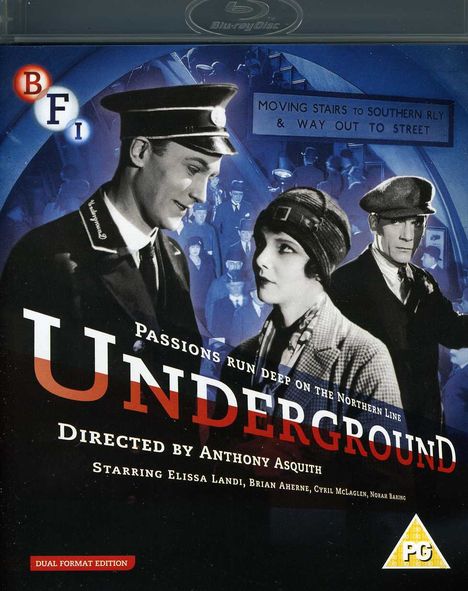Underground (1928) (Blu-ray & DVD) (UK Import)
Underground (1928) (Blu-ray & DVD) (UK Import)
2
Blu-ray Discs
Blu-Ray Disc
Die Blu-Ray wurde als High-Definition-Nachfolger der DVD entwickelt und bietet ihrem Vorläufer gegenüber eine erheblich gesteigerte Datenrate und Speicherkapazität. Auf Blu-Rays können daher Filme mit deutlich besserer Auflösung gespeichert werden und bieten auf entsprechenden Bildschirmen eine enorm hohe Bildqualität. Blu-Ray-Player sind in der Regel abwärtskompatibel zu DVDs, so dass auch diese abgespielt werden können.
Nur noch 1 Stück am Lager.
-18%
EUR 21,99**
EUR 17,99*
*Sonderpreis gültig solange Artikel am Lager
- Großbritannien, 1928
-
Dieser Titel ist nicht FSK-geprüft.
Eine Lieferung an Minderjährige ist nicht möglich.
Infos zu Titeln ohne Jugendfreigabe - Bestellnummer: 2611931
- Erscheinungstermin: 17.6.2013
- Serie: BFI (British Film Institute)
-
Genre:
Drama
Spieldauer: 93 Min. - Regie: Anthony Asquith
- Darsteller: Elissa Landi, Brian Aherne, Norah Baring
- Filmmusik: Neil Brand
- Deutscher Titel: Der Schrei aus dem Tunnel
- Sprache: Stummfilm
- Tonformat: DTS-HD 5.1/PCM 2.0
- Bild: 4:3 (s/w)
- Untertitel: Englisch
The BFI National Archive’s acclaimed restoration of Anthony Asquith’s subterranean tale of love, jealousy and murder is finally available in this stunning Dual Format Edition. This classic British film from the silent era features Neil Brand’s new orchestral score, recorded live in 2012, which perfectly complements the film’s richly detailed evocation of 1920s London.
From his own screenplay Anthony Asquith balances the light and dark sides of London life, aided by a superb cast of Brian Aherne and Elissa Landi as the nice young lovers, and Norah Baring and Cyril McLaglen as their unhappy counterparts.
More than any other film from Britain’s silent canon, Underground evokes the life of the ordinary Londoner with its scenes of the bustling underground and the capital’s parks, double-decker buses, pubs and shabby bedsits.
Specials
Feature presented in both High Definition and Standard Definition
Newly commissioned score by Neil Brand presented in 5.1 and 2.0
Alternative score by Chris Watson
Restoring Underground (2009, 9 mins): featurette on the restoration
The Premier and His Little Son (1909-12, 1 min): previously unseen footage of Anthony Asquith as a child
A Trip on the Metropolitan Railway (1910, 13 mins, DVD only)
Scenes at Piccadilly Circus and Hyde Park Corner (1930-32, 6 mins, DVD only)
Seven More Stations (1948, 12 mins, DVD only): a film about the expansion of the Central Line beyond Stratford
Under Night Streets (1958, 20 mins): a documentary about the tube's nightshift workers
Illustrated booklet featuring film notes and new essays by Christian Wolmar and Neil Brand
From his own screenplay Anthony Asquith balances the light and dark sides of London life, aided by a superb cast of Brian Aherne and Elissa Landi as the nice young lovers, and Norah Baring and Cyril McLaglen as their unhappy counterparts.
More than any other film from Britain’s silent canon, Underground evokes the life of the ordinary Londoner with its scenes of the bustling underground and the capital’s parks, double-decker buses, pubs and shabby bedsits.
Specials
Feature presented in both High Definition and Standard Definition
Newly commissioned score by Neil Brand presented in 5.1 and 2.0
Alternative score by Chris Watson
Restoring Underground (2009, 9 mins): featurette on the restoration
The Premier and His Little Son (1909-12, 1 min): previously unseen footage of Anthony Asquith as a child
A Trip on the Metropolitan Railway (1910, 13 mins, DVD only)
Scenes at Piccadilly Circus and Hyde Park Corner (1930-32, 6 mins, DVD only)
Seven More Stations (1948, 12 mins, DVD only): a film about the expansion of the Central Line beyond Stratford
Under Night Streets (1958, 20 mins): a documentary about the tube's nightshift workers
Illustrated booklet featuring film notes and new essays by Christian Wolmar and Neil Brand

Underground (1928) (Blu-ray & DVD) (UK Import)
EUR 21,99**
EUR 17,99*



